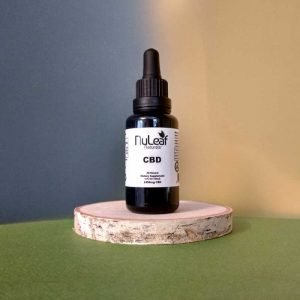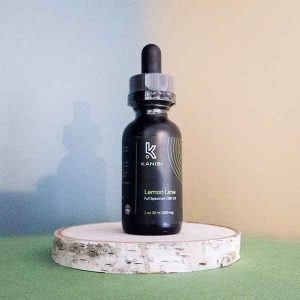For years, a stereotypical image of the cannabis user has most often involved a couch-dwelling dude with a bag of crunchy snacks.
Famous for inducing the “munchies,” past assumptions about the effects of cannabis use hardly bring to mind the image of health and vitality. But what about using CBD oil for weight loss?
Multiple case-studies as well as peer-reviewed research results have revealed an interesting surprise: cannabinoid use is actually associated with lower body weight and reduced BMI when compared to non-use.
So, should you ditch your diet and switch to CBD? Read on to learn what we know so far about CBD oil for weight loss.
Weight Loss and the Endocannabinoid System
QUICK OVERVIEW: Our Top Picks for CBD Oil for Weight Loss
| IMAGE | PRODUCT | |
|---|---|---|
 | Our Top Pick NULEAF NATURALS, FULL SPECTRUM CBD OIL
| CHECK BEST PRICE → |
 | RE BOTANICALS, HEMP 25 CLASSIC TINCTURE
| CHECK BEST PRICE → |
 | KANIBI, FULL SPECTRUM CBD OIL
| CHECK BEST PRICE → |
Better body composition among cannabis users compared to non-users may sound paradoxical. But an explanation may lie within the function of the endocannabinoid system (ECS).
The ECS is a complex network of neurotransmitters and receptors. It is found throughout the body, but is primarily located in the nervous and immune systems.
The neurotransmitters include substances called “endocannabinoids.” The body makes them to relay messages to cells via the receptors. Plant cannabinoids – or phytocannabinoids – like CBD act in similar ways as the endocannabinoids.
Alicia Salazar, a New York state board certified health coach, uses CBD with her clients to maximize their health outcomes. “I don’t look at CBD as a magic bullet for weight loss,” she said. “But CBD along with a healthy diet – one that contains healthy fats, whole grains, grass-fed meat and dairy, and plenty of greens, without processed foods and sugar – sets the tone for a healthy weight. And for some, that can naturally include weight loss.”
Best CBD Oils
Looking for the best CBD oils out there? These are just a few examples of trusted brands that we’ve fully vetted for quality:
Or, you can check out our full ranking of the 20 Best CBD Oils for 2019.
How Can CBD Oil Help with Weight Loss?
Correcting a calorie excess with a calorie deficit sometimes works for weight loss, but it can be difficult. First of all, reducing calories leaves people feeling hungry, which can be incredibly uncomfortable. Second of all, weight gain can cause changes to hormone levels and balance, metabolic patterns, inflammation status, and balance within the endocannabinoid system.
Sustainable weight loss requires a return to healthy balance within these body systems. Studies have shown that cannabinoids are not only effective for regulating the ECS, but can also positively impact the dysfunction occurring in other systems.
Ric Tyler, a certified holistic cannabis practitioner, has found that balance is essential. “I have used and recommended CBD for homeostasis and to bring the endocannabinoid system into proper tone so that it can properly serve other bodily processes,” he says.
In his practice, Tyler has not seen evidence of CBD acting directly to facilitate weight loss. Rather, he has found that it may correct imbalances that would otherwise prevent extra weight from coming off.
So, what does the evidence show about using CBD oil for weight loss? Read on to learn about the latest research.
Insulin Resistance
One major feature of obesity and diabetes is insulin resistance. The normal metabolic process follows a repeatable pattern:
- Food is consumed
- Blood glucose levels rise
- The pancreas releases insulin to shuttle that glucose to the body cells
- The cells use the glucose to make energy.
In conditions when eating patterns chronically provide excess glucose, the system breaks down. Body cells are unable to take on more glucose, so they become resistant to insulin’s signal to let the simple sugar into the cell.
Because it is so dangerous for blood glucose levels to remain high, the pancreas secretes even more insulin. Eventually, glucose levels plummet from the unusually high levels of insulin. That leaves the individual feeling sluggish, hungry, and vulnerable to repeat the cycle. Enter the “blood glucose roller coaster”.
Dietary changes are the most important action individuals can choose to get off the roller coaster. But CBD could lend a hand in the process. A 2018 study showed that the cannabinoids THC, CBD and CBN enhance cells’ ability to take up glucose. And they perform even better than metformin, a common pharmaceutical prescribed to lower elevated blood glucose.
Mitochondrial Dysfunction
Mitochondria are the energy factories of the cells. When insulin delivers glucose to the cells, the mitochondria transform it into energy. But when insulin resistance sets in, the mitochondria experience dysfunction as well.
Not only does mitochondrial dysfunction occur in imbalanced glucose conditions, but it may also play a role in cancer. Healthy mitochondria are essential for lasting vitality.
In 2016, a lab study observed the impact of CBD on the metabolic function of fat cells. This study noted a marked improvement in mitochondrial function with the application of CBD.
Inflammation
Cannabidiol’s ability to improve inflammatory conditions is well documented. Within metabolic dysfunction, inflammation is consistently present. One of the more insidious actions of inflammation in this condition is that found in the pancreas.
The increased activity of the pancreas in an attempt to secrete additional insulin can cause inflammation throughout the gland. That chronic inflammation can actually destroy the beta cells which are the sites that secrete insulin. This downward spiral diminishes the body’s ability to make insulin at all – a dangerous path that can lead to diabetes.
Another 2016 study showed that an overstimulated endocannabinoid system contributes to this inflammation. The application of CBD corrected some of the dysfunction. The antioxidant and anti-inflammatory effects of CBD relieve the inflammation and potentially rescue pancreatic function. These actions may save individuals from diabetes.
Fat Gain
One of the greatest risk factors for obesity and diabetes is increased body fat. While this may seem obvious, the mechanisms of the process are not necessarily straight forward.
Not all fat cells are created equal. The most dangerous type of fat cells are “white” fat cells, which tends to gather around organs and stress their function.
The more benign type of fat cells are “brown” fat cells, which are often referred to as “baby fat”. This softer fat is easily used by the body to maintain body heat. White fat is much harder to lose.
The previously mentioned study which established improved mitochondrial function with CBD use also observed that CBD stimulates gene expression within white fat cells. This initiates the “browning” of these cells. This mechanism shows promise with converting hard-to-lose white fat into a more easily burnable form. Additionally, researchers found that CBD decreased the rate of new fat cell creation.
Liver Damage
Another marker of obesity and diabetes includes damage to liver cells. The liver is a major organ in the conversion between stored energy forms and useable energy forms in the body. Overburdening that system, such as with high fructose intake, can have disastrous effects. Inflammation within the liver indicates the onset of dysfunction, and possibly non-alcoholic fatty liver disease.
In 2015, researchers analyzed the impact of two non-psychoactive cannabinoids – CBD and THCV – on metabolic dysfunction.
Results indicated that these substances reduce the buildup of triglycerides in the liver. In addition, they improved insulin resistance and lowered blood pressure in human subjects with type 2 diabetes. The anti-inflammatory qualities of CBD take partial credit for these improvements.
The Verdict on CBD Oil for Weight Loss
The evidence weighs heavily towards the health of the endocannabinoid system being inextricably tied to the health of the whole body. In fact, measuring levels of endocannabinoid activity is a newly proposed marker of metabolic health.
Overall, this recent research shows great promise in developing new potential therapies that are effective and safe for obesity and diabetes.
It’s important to remember, though, that these areas of study are still very new and in their early stages. This makes it hard to predict just how far their reach and impact will be. Combined with lifestyle and dietary changes, prescribed cannabinoid use will very likely be a pivotal intervention in the future of obesity and diabetes management and recovery.
Editor's Choice: CBD Oil Drops
Ready to add CBD to your wellness routine? These are a few of our team’s top recommendations.
And if you’d like to see more complete product reviews (and lab results!), check out this year’s ranking of the Best CBD Oil Drops.
NuLeaf Naturals, Full Spectrum CBD Oil
NuLeaf Naturals offers Colorado-grown, full spectrum CBD oil that offer among the most trace cannabinoids per drop of any product we’ve tested.
Save 20% with code: cbdhacker.
RE Botanicals, Hemp 25 Classic Tincture
Founded by a veteran of the hemp industry and an advocate for regenerative agricultural practices, RE Botanicals is one of the first CBD brands to qualify for organic certification from the USDA — and they beat many of their competitors on pricing!
Save 10% with code: cbdhacker.
Kanibi, Full Spectrum CBD Oil
Kanibi uses Kentucky-grown hemp, precision formulas, and rigorous quality testing. And you can choose from five stevia-sweetened flavors to satisfy your sweet tooth!
Save 10% with code: cbdhacker.
Shop Now
This product is sold by CBD Hacker’s partner entity.







